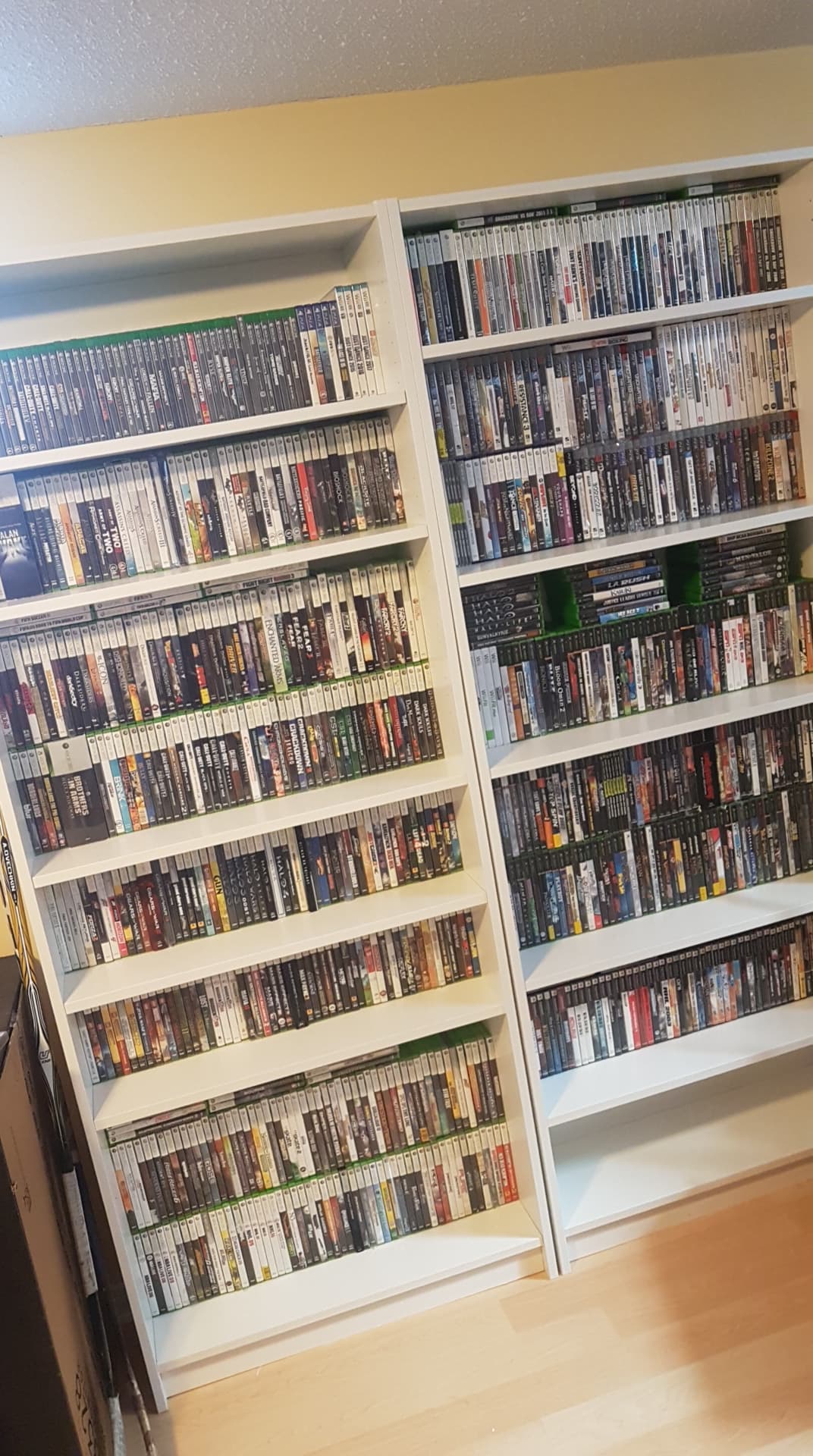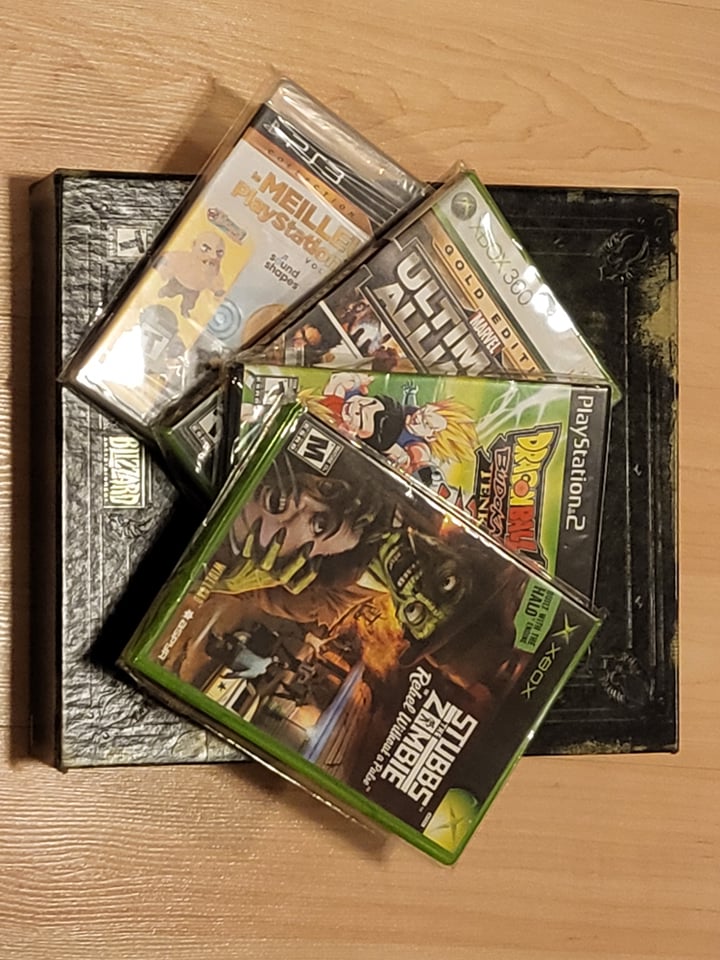My Video Game Collection
Time to read: 6 min read
# How It All Started
Growing up I enjoyed video games but was never given an allowance; I thus had to determine other avenues to get the funds to buy games. That avenue came in the form of my first job at age 10 of being a paperboy.
I'd spend one to two hours every week inserting flyers into the local paper and delivering them to the 79 houses on my route. For my efforts, I was rewarded a pittance of $3-4 a week. Doing the math at the time, a new game sold at $59.99 (~63 to ~$67 after tax); with my meager wages, it'd take me almost 20 weeks of labour to be able to afford a new video game release.
Used games, however, had much more variable pricing. People, espcially those looking to sell their collection of games to clear space, would sell their older generation games for cheap, often in lots where games are priced for well under $5 each. This obviously made for a much more feasible game-buying opportunity for cash-strapped 10 year old me. I remember perusing classified ads on Kijiji and taking the bus around town to buy used games off of parents selling their kid's older games and people looking to clear storage space.
In addition to the accessible price point, another advantage of buying used older games is that, after a while, the dirt-cheap games are considered "retro" and actually increase in value, and certain more desirable titles actually go up in value so much that they become more valuable than new games. With my knowledge of specific games, I was able to adversely select sellers who don't know or don't care about the value of individual games; oftentimes, I was able to buy entire lots of games and sell off the more expensive titles to get the rest of the games for essentially free (minus the time it takes for me to buy and sell the games, which at the time was valued at less than $4 per hour). With this arbitrage strategy, I was able to buy hundreds of games for essentially no money (and even made some money on the side).
 My Game Shelves
My Game Shelves
TIP
There are certain characteristics which drive the value of physical games:
For more recent games (within 3-4 console generations of current gen), the price tends to be inversely related to the value of the game (the older the game is, the less valuable it is). For games from 4+ generations ago, the price tends to gradually increase along with age due to their lack of availability.
Games from certain consoles, especially those which are considered childhood-nostalgic for people (Gamecube, Ninetendo 64, etc.) or are less common (PS Vita, Wii U, etc.) tend to be more valuable or hold on to their value better than more mainstream consoles with general population appeal such as the Xbox or PS2.
Games by certain publishers also tend to hold their value; Nintendo franchises in particular (Pokémon, Mario, etc.) tend to maintain their value and can sometimes be worth much more than their price when initially sold for brand-new in retail stores.
Japanese games in general, especially more niche RPGs, also hold their value.
The conditions of the game matters, having the original packaging (manual/original case and coverart for disk-based games and manual/inserts/cardboard box for cartridge-based games) greatly increases a game's value. Unopened sealed games are the most valuable.
Grading games can multiply the value of the game, although the vast majority of games aren't valuable enough to be worthwhile to grade.
Lower print games are more valuable because of their lack of supply; games with exclusive content on-disk, especially if that content is not available in any other form (delisted from online store, etc.), is very valuable (Marvel Ultimate Alliance Gold Edition, for instance, contains downloadable content no longer available elsewhere due to licensing issues).
The most valuable games, however, are those which are fun (highly-rated) but are also low-print (games such as Little Samson and Stubbs the Zombie were virtually unknown/unpopular when they were first released, but have steadily built up a fanbase over the years).
Certain factors can drop the value of games, such as them being re-released as remasters (for more current games) or compilations (for older games). Franchises which were dropped but then resumed will also lower game values for games in the franchise. Video games will drop in value once they are more widely available.
On top of games, I also managed to buy several consoles; one of my favourite things to do was to dissemble old consoles, clean and fix them, and reassemble everything. It gave me great satisfaction to work with my hands and to also save old broken consoles from the dumps.
There aren't many extremely valuable games in my collection as I mostly collect games from around the time of my childhood, which are disk-based and more widely available. I especially like games which are original or have unique peripherals.
 Some of the Rarer Games in my Collection
Some of the Rarer Games in my Collection
# How It's Going
I haven't been as active as I used to be when I was 10; there are many reasons, among them the lack of time and the more efficient video game market. I have much more responsibilities than when I was 10 and the opportunity cost of my time is much higher than the $3-4/hr I had back in the day. I no longer have as much time to dedicate to video games; how cruelly ironic that when I finally have the means to buy games, I no longer have the time to play them. The video game collecting scene has also changed greatly since when I first started: the market is much more commercial, as resellers bid the prices up for local games and people are more aware of the value of their used games. It's often not worth my time to monitor classified ads and drive across town to buy and sell games.
Video game prices have been rising of late, perhaps due to the boredom spurred by the pandemic; I've been spending time documenting my collection. I think video games, although not very scalable, makes for an interesting esoteric asset class. I've also been taking advantage of the recent price surge to sell off duplicate games from my collection on my new eBay store.
I do still play games from time to time, mostly with friends online on my new PC, which doesn't even have a disc drive for physical media. As the market for video games shifts more and more towards digital-only, I wonder if there will still be enough demand for publishers to release physical games. Perhaps physical games will just be a footnote in the history of video games, or perhaps not, maybe, like sports or Pokémon cards, there will always be a desire for people to hold something physical.